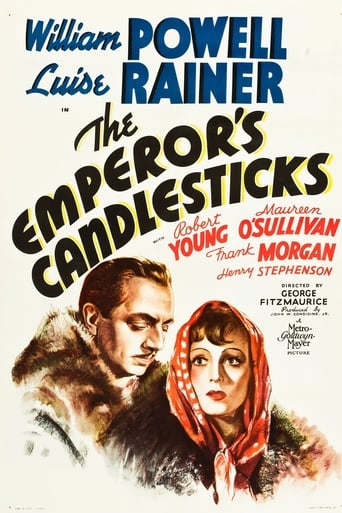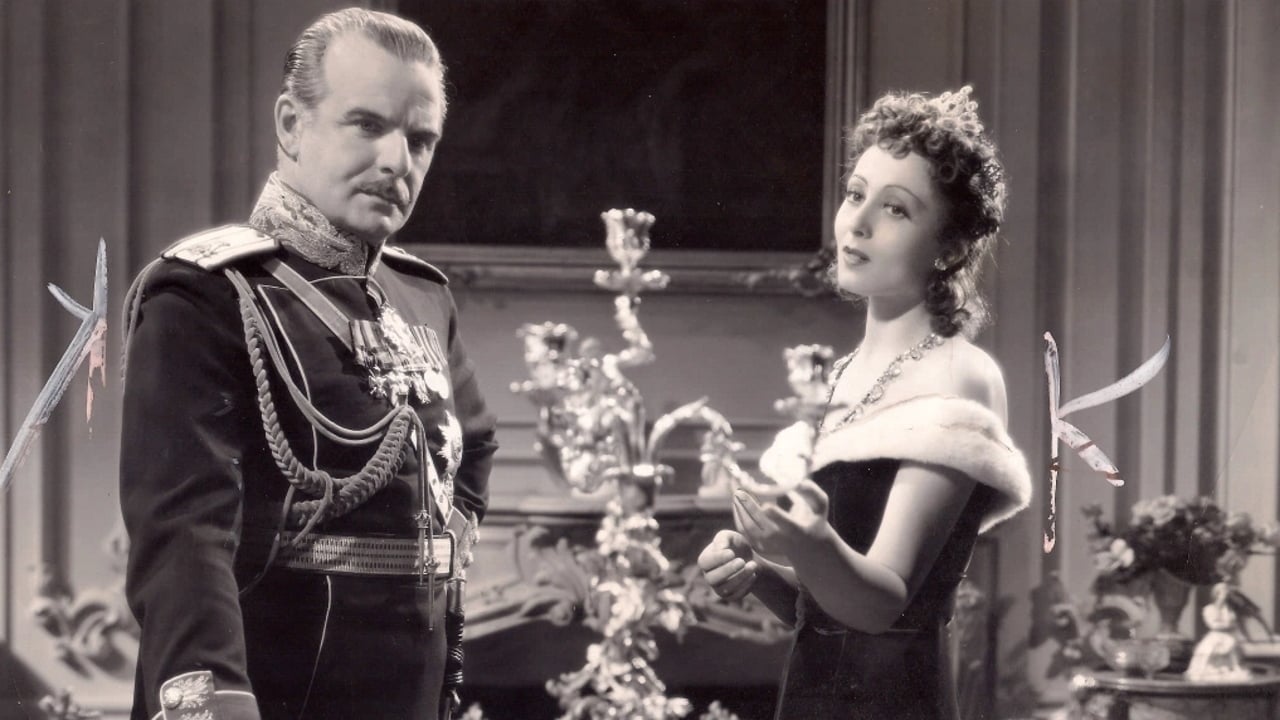SimonJack
By the mid-1930s, the Poles and Russians had been feuding bitterly for nearly 1,000 years. The first two decades of the 20th century had been tumultuous for much of the world, culminating with WWI – the war to end all wars. Near the end of that war, France executed Mata Hari, an exotic dancer from the Netherlands. She was convicted of spying for Germany against the Allies. Espionage was now commonly known to exist between rival countries, especially the Soviet Union and Western Europe. All of this provided a solid background for the plot in "The Emperor's Candlesticks." It is based on a novel by the same name written by Baroness Emmuska Orczy. The Hungarian-born British author was one of the early female writers of mystery and intrigue. Her best works were in historical fiction. The most famous of these were "The Scarlet Pimpernel" and its sequels. Two excellent adaptations of the Pimpernel have been made into movies – in 1934, and 1982 for TV.While Orczy's book was published in 1899, the 19th century had much of the same political turmoil as the early 20th century. Orczy moved several times throughout Europe with her family before settling in London. No doubt, she had read or heard about suspected espionage between nations in that time. So, she wove a very nice tale of secrecy and intrigue into this story with a subdued but blooming romance.For its part, Hollywood's MGM team added some wit and glamor to the story and made it an all around appealing movie with top stars. Some other reviewers before the time of this writing (Oct. 2013) didn't see much in the plot, or thought it very silly. Certainly, the background for the plot was spot on for the time and geography of the film. As to the story – well, it's fiction, and romance, and entertainment – what many movies are meant to be. I found this an overall interesting and most enjoyable movie. It has just the right amount of intrigue with a light touch of wit and humor. And, in the hands of William Powell, Luise Rainer, Robert Young and supporting cast, it's a very good movie. There's one piece of trivia that might be of interest to viewers. A scene toward the end of the film has the Russian Czar in it, but we never see the actor's face. At the time of this movie, and well into the 1950s, Hollywood would not show on film the faces of actors in roles of key world figures – such as the U.S. President, or kings, queens or other prominent rulers. Today, of course, it would seem awkward not to show the faces of actors in any roles. Perhaps, in times past those offices were held in higher regard and public esteem than they are today?
edwagreen
No wonder Luise Rainer's career went south following this film and several others. Following her Oscar wins, Ms. Rainer was rushed into some poor films and the results showed quickly.In this film, she sounds like she has congestion, but people would say that this was because of her accent.A tale of Polish and Russian spies, the entire concept needed reworking. The writing is weak, the performances by Rainer and Powell just aren't there because they're given such poor material to work with.As the Countess Mironova, Rainer acts and looks like a refugee living in Brooklyn. She appears as one of the foreigners you would meet at a marketplace.The plot is a good one. Polish nationalists kidnap a Russian emperor's son in the hopes that a Polish nationalist will be freed. Instead of concentrating on this, the film devotes itself to how 2 spies, Rainer and Powell, try to outwit each other by getting the candlesticks which reveal important information inside.Frank Morgan provides some comic relief to Robert Young, the victim of the kidnapping. Yet, his part is mainly understated as is the problem with the entire film.
MartinHafer
The handsome Prince (Robert Young) has been kidnapped and will be killed unless a Polish secret agent (William Powell) is able to sneak a ransom note to the Czar. Unfortunately, he chose a rather silly place to hide the note (inside a specially created candlestick) and it is lost. At the same time, a Russian spy (Luise Rainer) is trying to sneak in letters incriminating Powell as a spy--and also hides them inside the matching candlestick--which also is lost. Lots of intrigue follows--as well as some MGM style romance.This film should have been better. After all, it starred the wonderful William Powell and had such supporting stars as Maureen O'Sullivan, Robert Young, Frank Morgan and Henry Stephenson--all fine actors. However, despite a decent script idea and such talent, the film was only okay. Much of this is because the script was rather tepid and talky--with too many scenes listening to the characters play verbal chess--trying to outfox each other. There was little 'zip' or excitement.In addition, some of the blame probably resides with co-star Luise Rainer. While Ms. Rainer only made a small number of Hollywood films, she had the distinction of winning two straight Best Actress Oscars. However, when you see these two performances as well as her subsequent films you wonder why she received such accolades. The performances just didn't age well. In the last week or so I have seen six of her more famous films, I can't help but think that she was a terribly over-rated star. I'm sure she's a nice person and is still thriving today at 98 years-old. But her style of acting usually included staring wide-eyed into space and often reciting her lines in an over-eager fashion--more like a girl in a high school play than someone trying to play a realistic performance. While Ms. Rainer was better in THE EMPEROR'S CANDLESTICKS than in some of her other films (particularly DRAMATIC SCHOOL and BIG CITY), she still was not up to starring against Powell.Now all this is NOT to say that this is a bad film--it's enjoyable enough. But there just isn't much spark or energy and could have been a lot more interesting. A decent time-passer and that's about it.
som1950
The plot of "The Emperor's Candlesticks" is total nonsense in the 1930s Hollywood fantasies about benevolent despots, courteous kidnappers, and gallant spies. The story is only an excuse for a masquerade ball and a dash across Europe in pursuit of two candelabras that do not belong to the Russian czar or the Austro-Hungarian emperor, but are a gift from an Austrian nobleman to a Russian noblewomen. The carriers (the Polish Baron Wolensky and the Russian Countess Mironova, played by the stars, William Powell and Luise Rainer) lose and find and mistakenly switch the pair of candelabras.Powell was unflappable in the midst of many ludicrous plots during the 1930s, often with Myrna Loy as a co-conspirator. Here, he is pitted against a lovely czarist secret agent, played, in a large wardrobe, by the great Luise Rainer. In the two immediately preceding films for which she won back-to-back Oscars ("The Great Ziegfeld" with Powell and "The Good Earth" with Paul Muni) and in her only other readily available film, "The Great Waltz," she suffered mightily. In "Candlesticks" she got a chance to play the kind of glamorous clothes horse role in which Marlene Dietrich specialized, with no occasion for jealousy at all. Dietrich and Greta Garbo both played spies in 1930s movies. Each appeared more sophisticated than Rainer's, but I find Rainer more credible as a spy with regrets about the consequences of her occupation than either Dietrich or Garbo. Rainer was also quite beautiful with high cheekbones and eyebrows as plucked as Dietrich, and received star keylighting from MGM.Back in a gilded cage, Robert Young got a chance to be charming and gallant, impeded by the humorous bumbling minder played by Frank Morgan.


 AD
AD


